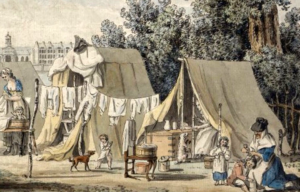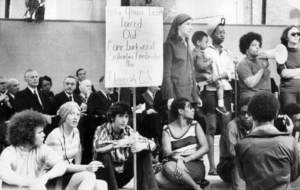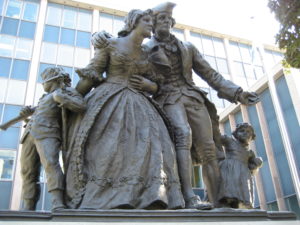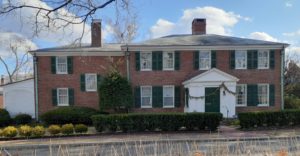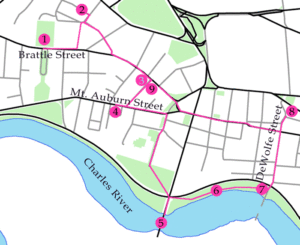Cambridge Branch of the Massachusetts Indian Association Records, 1886-1923
Library of Congress Subject Headings
Series Description and Folder Listing
2 document boxes
.625 cubic feet
Processor: Christopher J. Lenney
Date: November 2004
Acquisition: The Records of the Cambridge Branch of the Massachusetts Indian Association
were conveyed to Cambridge Historical Society on 22 November 1923, when the membership voted to disband. This decision is recorded in the minutes of the annual meeting of that date.
Access: There are no restrictions to items in this collection.
Permission to Publish: Requests for permission to publish from the collection should be made from the Executive Director.
Copyright: The Cambridge Historical Society does not hold copyright on the materials in the collection.
The Massachusetts Indian Association was established in 1883, as an auxiliary of the (Women’s) National Indian Association, founded four years earlier by Mary Bonney and Amelia Quinton. Two influential books by Helen Hunt Jackson, A Century of Dishonor (1881) and Ramona (1884), had a galvanizing effect in the initial stage of this reform movement. The national organization ultimately numbered 60 branches in 27 states.
The Cambridge Branch of the Massachusetts Indian Association was established on 21 January 1886. According to its constitution (Box 2, Folder 4), “the objects of this organization shall be, first, to strengthen by every means in its power such a Christian public sentiment as shall aid our government in abolishing all oppression of Indians within our national limits, and in granting to them the same protection of law that other races enjoy among us; secondly, to aid in the educational and mission work pursued by the Massachusetts Indian Association.”
One immediate objective of the Cambridge group was to help secure passage of the Dawes General Allotment (or “Severalty”) Act (1887), sponsored by Massachusetts Senator Henry L. Dawes, chairman of the Committee on Indian Affairs. This reform act promoted an assimilationist policy and provided for grants of land and citizenship to individual Indians under certain conditions, effectively serving to break up tribal lands and organization. In the words of a modern critique (Dussais,1999), the intent was to make Indian men into farmers and Indian women into “model farm wives.” “White women were hired as “field matrons” to teach Indian women to perform the role that Euro-American society deemed appropriate for their gender.” The Cambridge women, however, as expressed in their own Historical Sketch (1911) looked on their role quite differently: the field matrons were appointed to “teach the arts of good housekeeping and industry.” The Dawes Act was ultimately deemed a failure and repudiated as federal policy in 1934.
By 1905, the Cambridge Branch numbered 207 members and was by far the largest of six branches across the state. As was characteristic of similar groups, the organization was virtually entirely female at all levels (including donors). Also typical of such groups, the Cambridge membership was socially prominent, and many were the wives of Harvard faculty. Members included Mrs. Louis Agassiz, Mrs. Charles W. Eliot, Mrs. Asa Gray, Miss Alice M. Longfellow, and Mrs. Silvio M. DE Gozzaldi. A parallel men’s organization, the Indian Rights Association, also existed and its local chapter is mentioned in the records. While the National Indian Association moved to admit men in 1901, locally at least, the Cambridge Branch appears to have remained largely a woman’s organization, although not so specified in its bylaws.
In celebration of its twenty-fifth anniversary in 1911, an extended essay on the history of the Cambridge organization was prepared by Ellen S. Bulfinch and published with the annual report for that year [Box 2, Folder 7].
By 1920, membership had declined to 134. The organization held its final meeting on 22 November 1923, with only thirty members present. The last annual report was read, in which it was lamented that “Our ranks are growing thinner and thinner and no helpers came forward, no new members this past year.” Upon further discussion, a motion to disband was carried unanimously. The treasurer recommended that the unexpended balance of $50.00 revert to the parent Massachusetts Indian Association. President Charles W. Eliot moved that the records be given to the Cambridge Historical Society, “to be kept by them….as showing the condition of the Indians and what has been done for them by Cambridge people during the past forty years. It was so voted.”
The work of the parent organization still continues (2004) in the form of the Massachusetts Indian Association Scholarship Fund, which makes grants twice yearly to tribal Indians for undergraduate or graduate study.
The records of the Cambridge Indian Rights Association are held by the Cambridge Public Library. The records of the Stockbridge Auxiliary of the Massachusetts Indian Association are held by the W.E.B. Du Bois Library, University of Massachusetts, Amherst. The records of the Salem Women’s Indian Association are held by the Peabody Essex Museum, Salem, Mass.
Bulfinch, Ellen S., “Historical Sketch, 1886-1911” (in the Annual Report of 1911).
Dussais, Allison M.. “Squaw Drudges, Farm Wives, and the Dann Sisters’ Last Stand: American Indian Women’s Resistance to Domestication and the Denial of Their Property Rights,” North Carolina Law Review, 77 (January 1999) : 637-730.
Hoxie, Frederick E. Encyclopedia of North American Indians. Boston, Mass.: Houghton Mifflin, 1996.
Kutler, Stanley I. Dictionary of American History. New York: Charles Scribner’s Sons, 2003. (see: “Dawes General Allotment Act”)
The Records of the Cambridge Branch of the Massachusetts Indian Association document the political, missionary, and charitable work of the organization in the betterment of Native Americans of the southwest, particularly the Navajo. Political activities included petitions, public meetings, and leafleting. Material support took such forms as boxes of clothing, medicines, and Christmas gifts sent to numerous reservations. Their financial support served to purchase land, an adobe cottage, and a hospital tent for a Navajo mission at Farmington, N.M., and covered the salary and expenses of the resident missionary as well. The group financed a desert irrigation project, known as “the Cambridge Ditch,” that brought water to twenty farms. Assistance was also given to help establish lace-making and other Indian industries. Only a small portion of what was apparently an extensive correspondence with missionary workers and other reform groups survives.
The bulk of Series I, Records, consists of 6 leather-bound volumes (1886-1923) kept by the recording secretary. In them are found the minutes of annual meetings, of monthly executive committee meetings, and of other special and public meetings (often with featured speakers). Printed annual reports, membership lists, press accounts, and printed leaflets were frequently pasted into the volumes by the recording secretary. More substantial annual reports were published in irregular years and these have been arranged chronologically in Box 2, Folders 4-8.
The sixth and final volume (1913-1923) was interleaved with a large amount of loose material, such as treasurer’s reports, correspondence, lists of officers, etc. These items were removed, labeled on the upper right corner: Vol. 6, p. 3 (etc.) to indicate where they occurred in the book, and then were arranged in Box 2, Folders 2-3 in the same order as they were found (which was largely chronological). Items labeled Vol. 6 front or back were found inside the covers.
Series II, Other Printed Materials, includes a reprint of The Clear Sunshine of the Gospel Breaking forth upon the Indians in New-England, which reflects the Cambridge group’s historical sense that they were carrying on the work of the early Puritan missionary and “Apostle to the Indians,” John Eliot.
Library of Congress Subject Headings
Massachusetts Indian Association—Cambridge Branch—Archives.
Indians of North America—Government relations—History—Sources.
Indians of North America—Social conditions—Sources.
Indians of North America—Missions—History—Sources.
Indians of North America—Legal status, laws, etc.
Indians, Treatment of—United States—History—Sources.
Women—Massachusetts—Societies and clubs.
Women—Charities.
Charities—Massachusetts.
Massachusetts—Societies, etc.—Women.
Massachusetts—Societies, etc.—Charitable and social work.
Cambridge (Mass.) —Societies, etc. —Women.
Cambridge (Mass.) —Societies, etc. —Charitable and social work.
Cambridge Branch of the Massachusetts Indian Association, Records 1886-1923
Series I. Records (1886-1923)
Box | Folder
1|1|Vol. I, 1886-1888
1|2|Vol. II, 1889-1891
1|3|Vol. III, 1892-1894
1|4|Vol. IV, 1895-1901
1|5|Vol. V, 1902-1912
2|1|Vol. VI, 1913-1923
2|2|Materials removed from Vol. 6
2|3|Materials removed from Vol. 6
2|4|Annual Report, 1887
2|5|Annual Report, 1891
2|6|Annual Report, 1902
2|7|Annual Report, 1911
2|8|Annual Report, 1917
2|9|Notices of annual meetings
Series II. Other Printed Materials
2|10|Massachusetts Commissioners to Examine into the Condition of the Indians of the Commonwealth, Report to the Governor and Council, concerning the Indians of the Commonwealth, under the Act of April 6, 1859. Boston, Mass.: W. White, 1861.
2|11|Shepard, Thomas, The Clear Sunshine of the Gospel Breaking forth upon the Indians in New-England. New York: Reprinted for J. Sabin, 1865.

